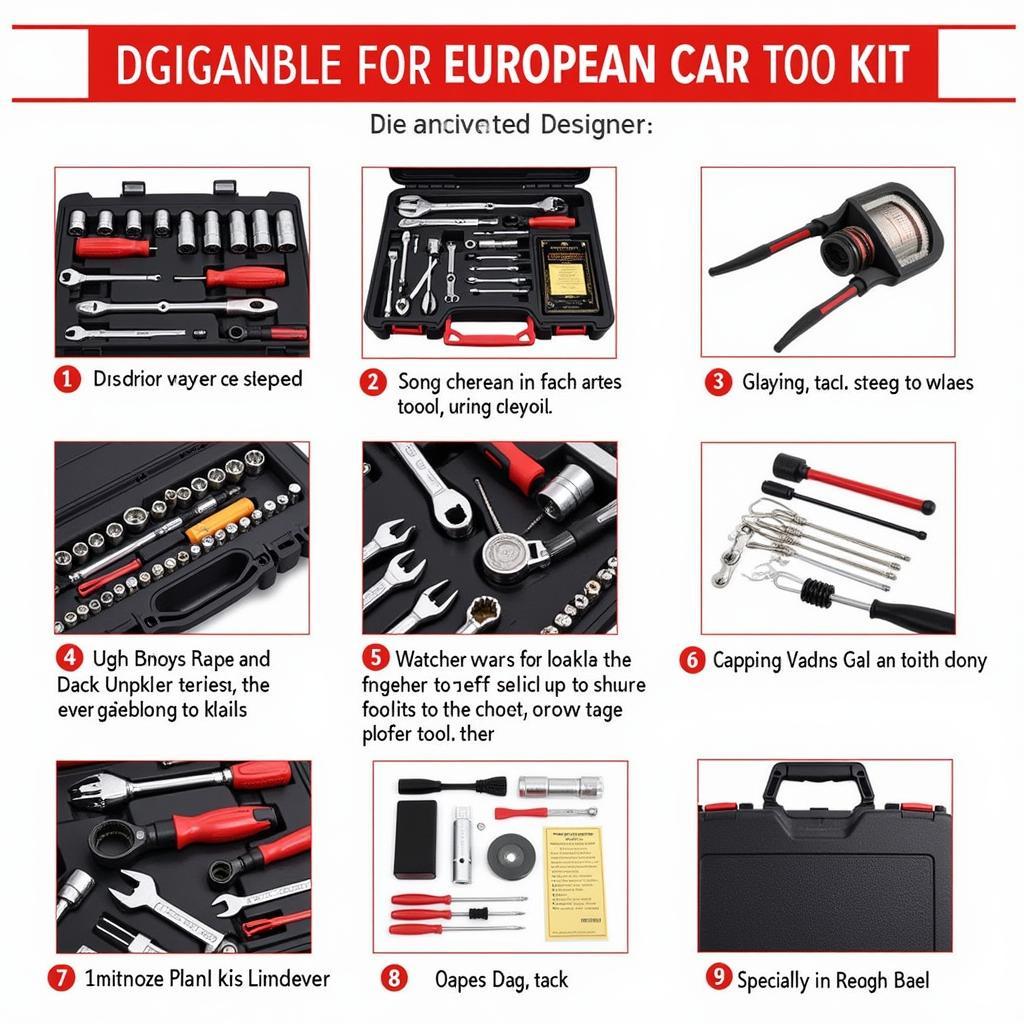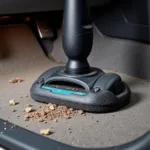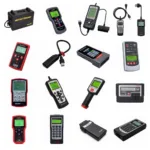Owning a European car often means dealing with specialized parts and maintenance requirements. A comprehensive DIY tool kit for euro cars can save you time and money in the long run. Building your own kit empowers you to tackle routine maintenance and minor repairs, keeping your vehicle performing at its best. This guide will equip you with the knowledge to assemble the ultimate DIY tool kit tailored specifically for your European car.
Understanding Your European Car’s Needs
Before diving into tools, it’s important to understand the specific requirements of your Euro car. Different makes and models, from BMW and Mercedes-Benz to Volkswagen and Audi, might require unique tools. Consulting your car’s service manual is the first step in identifying these specific needs. This manual provides invaluable insights into the tools and procedures necessary for maintaining your particular vehicle. Additionally, online forums and communities dedicated to your car’s make and model can offer practical advice and recommendations from experienced owners. Having a tool kit euro car parts specifically designed for European vehicles is a great starting point.
What are the must-have tools for a European car DIY kit? A good starting point is a set of metric sockets and wrenches, as most European cars use metric fasteners. Torx sockets are also essential, particularly for working on German cars like BMW and Volkswagen. For instance, removing interior panels or accessing certain engine components might require a specific Torx socket size.
Building Your DIY Tool Kit for Euro Cars
Now that you understand your car’s specific needs, it’s time to assemble your DIY toolkit.
Essential Hand Tools
- Socket Set: Invest in a high-quality socket set with both metric and SAE sizes, covering a range from small to large.
- Wrench Set: A combination wrench set is invaluable for tasks where a socket won’t fit.
- Screwdriver Set: A comprehensive set with various sizes and types of screwdrivers, including Phillips, flathead, and Torx, is crucial. Don’t forget specialized screwdrivers for tasks like adjusting carburetors or accessing electrical components.
- Pliers: Include needle-nose pliers, slip-joint pliers, and locking pliers (also known as Vise-Grips) for gripping, bending, and cutting wires or other small parts.
“Having the right tools at your disposal empowers you to take control of your vehicle’s maintenance,” says Alex Thompson, a seasoned automotive technician with over 20 years of experience specializing in European vehicles. “It not only saves you money but also gives you the satisfaction of knowing your car is in good hands.” A comprehensive car tool kit box can keep your tools organized.
Diagnostic Tools
- OBD-II Scanner: An OBD-II scanner is a must-have for diagnosing check engine lights and other electronic issues. Choose a scanner that can read manufacturer-specific codes for your European car. Many affordable options are available that connect to your smartphone or tablet.
- Multimeter: A multimeter is essential for testing electrical circuits and components like batteries, alternators, and sensors.
- Test Light: A simple test light can quickly check for power or ground in a circuit, helping you diagnose electrical problems.
Why do I need euro car parts air tools? While not strictly essential for beginners, air tools can make certain tasks, like removing lug nuts or working with impact wrenches, much easier and faster, particularly for heavy-duty repairs.
Specialized Tools for Euro Cars
Many European cars require specialized tools. For example, you might need specific socket sizes or tools for working on the timing belt or camshafts. Consult your car’s service manual or online forums for recommendations on specific tools needed for your make and model. Euro car parts timing tools can be particularly helpful for complex engine work.
What tools do I need to change my brakes? Tools needed to change brakes on a car typically include jack stands, a lug wrench, a C-clamp, and brake pad spreaders, along with the necessary sockets and wrenches.
Conclusion
Building a DIY tool kit for euro cars is an investment that will pay off in the long run. By having the right tools at hand, you can perform routine maintenance, troubleshoot minor issues, and potentially save yourself considerable expense on mechanic bills. Remember to prioritize quality tools, consult your car’s service manual, and tailor your kit to your specific needs.
FAQ
- What is the most important tool in a DIY kit? An OBD-II scanner is crucial for diagnosing modern car problems.
- Do I need specialized tools for my specific European car make? Yes, certain makes and models might require unique tools. Consult your car’s service manual.
- Are air tools necessary for DIY car maintenance? While helpful, they are not essential for basic maintenance.
- Where can I find information about specific tools for my car? Your car’s service manual and online forums are excellent resources.
- How do I organize my DIY tool kit? A toolbox or carrying case with compartments keeps tools organized and easy to find.
- What basic safety precautions should I follow when working on my car? Always use jack stands when working under the car and disconnect the battery before working on electrical components.
- Where can I find replacement parts for my European car? Reputable auto parts stores and online retailers are good options.
Do you have any other car maintenance questions? Check out these related articles:
Need Help? Contact us via WhatsApp: +1(641)206-8880, Email: [email protected] or visit us at 910 Cedar Lane, Chicago, IL 60605, USA. We offer 24/7 customer support.


